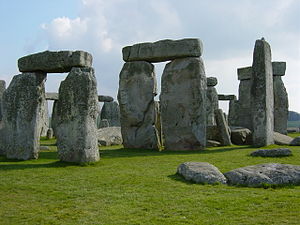The territory that now constitutes England, a country within the United Kingdom, was inhabited by ancient humans more than 800,000 years ago as the discovery of flint tools and footprints at Happisburgh in Norfolk has revealed. The earliest evidence for early modern humans in North West Europe is a jawbone discovered in Devon at Kents Cavern in 1927, which was re-dated in 2011 to between 41,000 and 44,000 years old. Continuous human habitation dates to around 12,000 years ago, at the end of the last glacial period. The region has numerous remains from the Mesolithic, Neolithic, and Bronze Age, such as Stonehenge and Avebury. In the Iron Age, England, like all of Britain south of the Firth of Forth, was inhabited by the Celtic people known as the Britons, but also by some Belgae tribes (e.g. the Atrebates, the Catuvellauni, the Trinovantes, etc.) in the south east. In AD 43 the Roman conquest of Britain began; the Romans maintained control of their province of Britannia through to the 5th century.The end of Roman rule in Britain enabled the Anglo-Saxon settlement of Britain, which is often regarded as the origin of England and the English people. The Anglo-Saxons, a collection of various Germanic peoples, established several kingdoms that became the primary powers in what is now England and parts of southern Scotland. They introduced the Old English language, which displaced the previous British language. The Anglo-Saxons warred with British successor states in Wales, Cornwall, and the Hen Ogledd (Old North; the Brythonic-speaking parts of northern England and southern Scotland), as well as with each other. Raids by the Vikings were frequent after about AD 800, and the Norsemen took control of large parts of what is now England. During this period several rulers attempted to unite the various Anglo-Saxon kingdoms, an effort that led to the emergence of the Kingdom of England by the 10th century.In 1066, the Normans invaded and conquered England. The Norman Dynasty established by William the Conquerer ruled England for over half a century before the period of succession crisis known as The Anarchy. Following the Anarchy, England came to be ruled by the House of Plantagenet, a dynasty which also had claims to the Kingdom of France; a succession crisis in France led to the Hundred Years Wars, a series of conflicts involving the peoples and leaders of both nations. Following the Hundred Years Wars, England became embroiled in its own succession wars; the War of the Roses pitted two branches of the House of Plantagenet against one another, the House of York and the House of Lancaster. Henry Tudor ended the War of the Roses and established the Tudor dynasty.Under the Tudors and later Stuart dynasty, England became a world colonial power. During the rule of the Stuarts, England fought the English Civil War, which resulted in the execution of King Charles I and the establishment of a series of republican governments, first a Parliamentary republic known as the Commonwealth of England, then as a military dictatorship under Oliver Cromwell known as The Protectorate. The Stuarts were restored to the throne in 1660, though continued questions over religion resulted in the deposition of another Stuart king, James II, in the Glorious Revolution. England, which had conquered Wales in the 13th century, was united with Scotland in the early 18th century to form a new sovereign state called Great Britain. Following the Industrial Revolution, Great Britain ruled a worldwide Empire, the largest in recorded history. Following a process of decolonisation in the 20th century the vast majority of the empire became independent; however, its cultural impact is widespread and deep in many countries of the present day.




Comentar
0